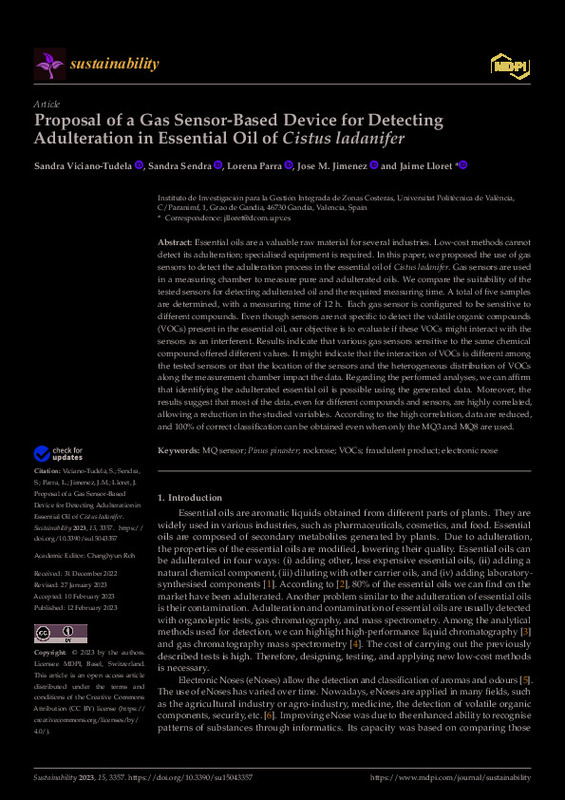JavaScript is disabled for your browser. Some features of this site may not work without it.
Buscar en RiuNet
Listar
Mi cuenta
Estadísticas
Ayuda RiuNet
Admin. UPV
Proposal of a Gas Sensor-Based Device for Detecting Adulteration in Essential Oil of Cistus ladanifer
Mostrar el registro sencillo del ítem
Ficheros en el ítem
| dc.contributor.author | Viciano-Tudela, Sandra
|
es_ES |
| dc.contributor.author | Sendra, Sandra
|
es_ES |
| dc.contributor.author | Parra, Lorena
|
es_ES |
| dc.contributor.author | Jimenez, Jose M.
|
es_ES |
| dc.contributor.author | Lloret, Jaime
|
es_ES |
| dc.date.accessioned | 2023-06-16T18:02:11Z | |
| dc.date.available | 2023-06-16T18:02:11Z | |
| dc.date.issued | 2023-02 | es_ES |
| dc.identifier.uri | http://hdl.handle.net/10251/194312 | |
| dc.description.abstract | [EN] Essential oils are a valuable raw material for several industries. Low-cost methods cannot detect its adulteration; specialised equipment is required. In this paper, we proposed the use of gas sensors to detect the adulteration process in the essential oil of Cistus ladanifer. Gas sensors are used in a measuring chamber to measure pure and adulterated oils. We compare the suitability of the tested sensors for detecting adulterated oil and the required measuring time. A total of five samples are determined, with a measuring time of 12 h. Each gas sensor is configured to be sensitive to different compounds. Even though sensors are not specific to detect the volatile organic compounds (VOCs) present in the essential oil, our objective is to evaluate if these VOCs might interact with the sensors as an interferent. Results indicate that various gas sensors sensitive to the same chemical compound offered different values. It might indicate that the interaction of VOCs is different among the tested sensors or that the location of the sensors and the heterogeneous distribution of VOCs along the measurement chamber impact the data. Regarding the performed analyses, we can affirm that identifying the adulterated essential oil is possible using the generated data. Moreover, the results suggest that most of the data, even for different compounds and sensors, are highly correlated, allowing a reduction in the studied variables. According to the high correlation, data are reduced, and 100% of correct classification can be obtained even when only the MQ3 and MQ8 are used. | es_ES |
| dc.description.sponsorship | This work has been funded by the "Ministerio de Ciencia e Innovacion" through the Project PID2020-114467RR-C33/AEI/10.13039/501100011033, by "Ministerio de Agricultura, Pesca y Alimentacion" through the "proyectos de innovacion de interes general por grupos operativos de la Asociacion Europea para la Innovacion en materia de productividad y sostenibilidad agricolas (AEI-Agri)", project GO TECNOGAR, and by the "Ministerio de Economia y Competitividad" through the Project TED2021-131040B-C31. | es_ES |
| dc.language | Inglés | es_ES |
| dc.publisher | MDPI AG | es_ES |
| dc.relation.ispartof | Sustainability | es_ES |
| dc.rights | Reconocimiento (by) | es_ES |
| dc.subject | MQ sensor | es_ES |
| dc.subject | Pinus pinaster | es_ES |
| dc.subject | Rockrose | es_ES |
| dc.subject | VOCs | es_ES |
| dc.subject | Fraudulent product | es_ES |
| dc.subject | Electronic nose | es_ES |
| dc.subject.classification | INGENIERÍA TELEMÁTICA | es_ES |
| dc.subject.classification | TEORÍA DE LA SEÑAL Y COMUNICACIONES | es_ES |
| dc.title | Proposal of a Gas Sensor-Based Device for Detecting Adulteration in Essential Oil of Cistus ladanifer | es_ES |
| dc.type | Artículo | es_ES |
| dc.identifier.doi | 10.3390/su15043357 | es_ES |
| dc.relation.projectID | info:eu-repo/grantAgreement/AEI/Plan Estatal de Investigación Científica y Técnica y de Innovación 2017-2020/PID2020-114467RR-C33/ES/RED HETEROGENEA INTELIGENTE DE SENSORES INALAMBRICOS PARA MONITORIZAR Y ESTIMAR EL CONTENIDO DE RESINA DE CISTUS LADANIFER/ | es_ES |
| dc.relation.projectID | info:eu-repo/grantAgreement/MINECO//TED2021-131040B-C31/ | es_ES |
| dc.rights.accessRights | Abierto | es_ES |
| dc.contributor.affiliation | Universitat Politècnica de València. Escuela Politécnica Superior de Alcoy - Escola Politècnica Superior d'Alcoi | es_ES |
| dc.contributor.affiliation | Universitat Politècnica de València. Escuela Politécnica Superior de Gandia - Escola Politècnica Superior de Gandia | es_ES |
| dc.contributor.affiliation | Universitat Politècnica de València. Instituto de Investigación para la Gestión Integral de Zonas Costeras - Institut d'Investigació per a la Gestió Integral de Zones Costaneres | es_ES |
| dc.description.bibliographicCitation | Viciano-Tudela, S.; Sendra, S.; Parra, L.; Jimenez, JM.; Lloret, J. (2023). Proposal of a Gas Sensor-Based Device for Detecting Adulteration in Essential Oil of Cistus ladanifer. Sustainability. 15(4):1-25. https://doi.org/10.3390/su15043357 | es_ES |
| dc.description.accrualMethod | S | es_ES |
| dc.relation.publisherversion | https://doi.org/10.3390/su15043357 | es_ES |
| dc.description.upvformatpinicio | 1 | es_ES |
| dc.description.upvformatpfin | 25 | es_ES |
| dc.type.version | info:eu-repo/semantics/publishedVersion | es_ES |
| dc.description.volume | 15 | es_ES |
| dc.description.issue | 4 | es_ES |
| dc.identifier.eissn | 2071-1050 | es_ES |
| dc.relation.pasarela | S\490244 | es_ES |
| dc.contributor.funder | Agencia Estatal de Investigación | es_ES |
| dc.contributor.funder | Ministerio de Economía y Competitividad | es_ES |








